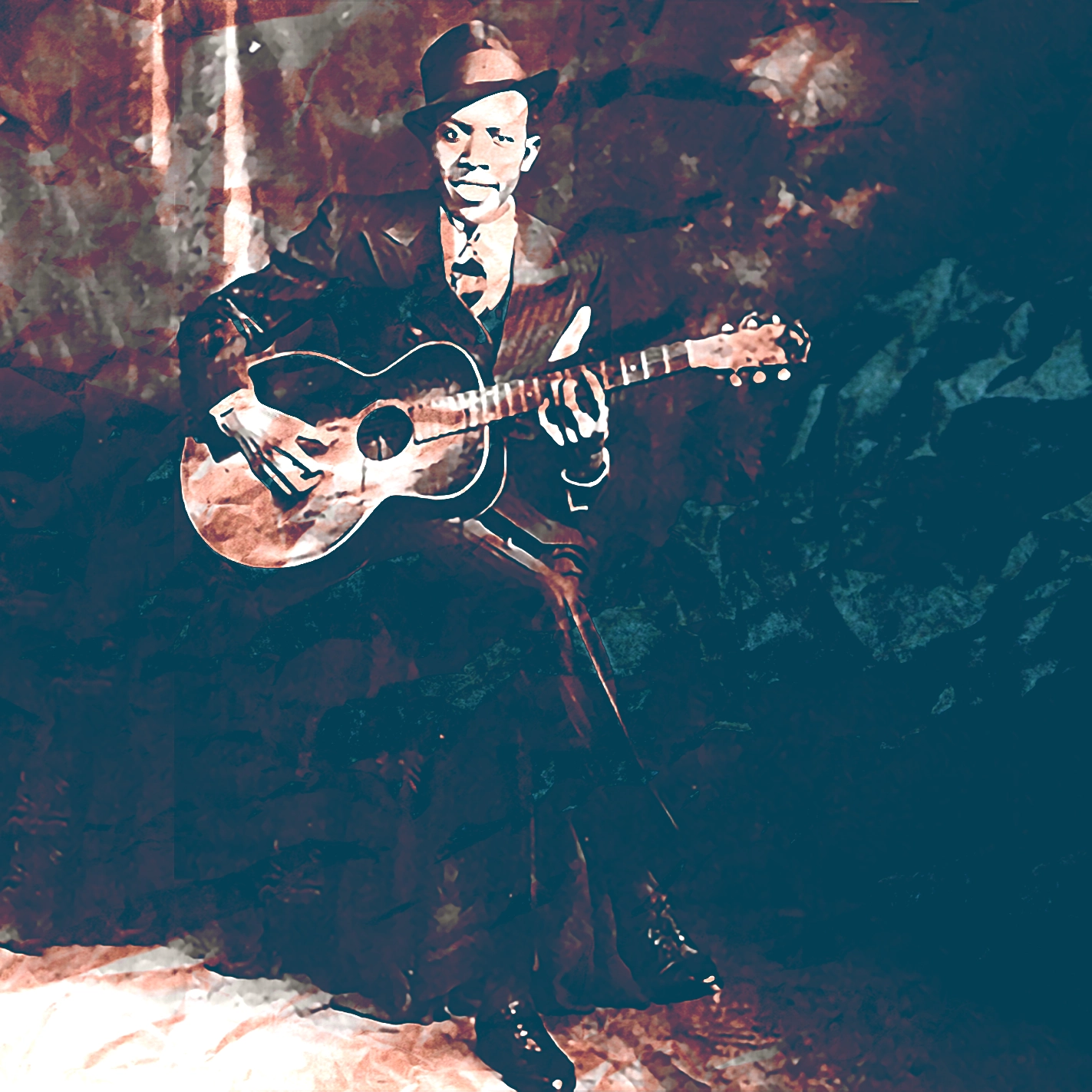Have you seen Sinners???? I’m OBVIOUSLY obsessed, and I’ve been deep into the TikTok convo and listening to lots of interviews with Ryan Coogler. I have watched a pirated copy of the Irish vampire dance a hundred times. The movie is full of folklore and symbolism, so I had to pick just one theme to write about, lest I descend into full Temu brand film school analysis and everyone closes this window after 100 words. So let’s talk about the legend of Robert Johnson, the blues player who was rumored to have sold his soul to the devil to learn to play the guitar.
The story of Johnson and his Faustian bargain comes up in a lot of Coogler’s interviews. He’s clearly an influence on the character of Sammie – especially when you watch the post-credits coda in Chicago (can we talk about the outfits in that scene?!!). Robert Johnson is known as the father of Delta Blues, which is the foundation of rock and roll in the US and the UK. Like so much of American popular culture, our distinctive brand of music is based on Black culture – even when it’s been sublimated into something coded as white, like rock music. That means that Robert Johnson’s deal with the devil underpins all of American popular music and culture. LET’S GET INTO IT!!!
Robert Johnson, the father of American music and “the first rock star” was born in Mississippi in 1911. He grew up bouncing between Hazelhurst, Memphis, and the Delta, and he taught himself how to play the guitar. He worked as a traveling musician, playing corners and juke joints all over the state. He was super talented and could memorize songs the first time he heard them, which helped him grow his audience and find a lot of work. At one point, he moved to Arkansas and came back with a whole new guitar sound. It’s said he played the guitar like a piano, which was a real innovation in music. That’s when the infamous story of the devil came up.
The famous legend about Robert Johnson is that he went to the crossroads and made a deal with the devil – he’d be a breakout musician, but the devil would take his soul. According to the legend, Johnson got his career, but died young, at age 27. He recorded only two albums before he died. Johnson was locally famous on the Mississippi circuit, but by the time his music filtered up to white execs and tastemakers, he had already died. Columbia bought the recordings, and eventually released King of the Delta Blues Singers, which brought Johnson national notice. In other words, the devil got his due.
This story is so famous that there’s even a monument to it in Clarksdale. There are multiple versions of it, too. In some, Johnson is tricked by the devil, who appears as a regular dude who offers to tune his guitar. In others, Johnson was instructed to go to the crossroads for this purpose. Some theorize that the deity at the crossroads wasn’t the devil at all, but Papa Legba, a Voodoo orisha who serves as guardian of the crossroads. [Note on the spelling: I use Voodoo because that’s the American way of writing it]. There would have been plenty of local Christians in the South at that time who kept up with the Old Gods as well, and Legba is an important figure.
Johnson isn’t the first or only musician to be accused of making a deal with the devil, either. The story was thought to be originally associated with another blues musician, Tommy Johnson. According to Season of the Witch: How the Occult Saved Rock and Roll, “Tommy sang in a ghostly falsetto, and he fostered this by putting out the rumor that he’d received this gift from the devil at a crossroads, a story perpetuated by his brother LeDell and pulled deep into the history and the mythology of the blues.” Johnson’s mentor, Ike Zimmerman, was also accused of learning how to play the guitar by visiting graveyards at midnight – suggesting some kind of witchcraft or devil magic. The truth is much more prosaic – he did practice in graveyards, but to keep from waking people up.
If you really want to get into the weeds, Italian violinist Niccolo Paganini was accused of this shit all the way back in the 1830’s! He played so incredibly that he was rumored to be possessed by the devil. People even claimed to have seen the devil playing next to him at a concert. Now, a violin is a fiddle and the fiddle is the devil’s instrument, so maybe like Johnson, his playing was so new and so sublime that the devil was jealous. Or somehow responsible. Charlie Daniels would like a word.
The 1960s in America were a type of crossroads, as well. The civil rights movement was well underway, and Black music was becoming mainstream in pop culture. Johnson’s blues were rediscovered and promoted at a time when Black music was being played by popular white entertainers (think Elvis), but also during the rise of Motown. White America was suspicious and afraid of Black music, even as young people were completely taken with it. The metaphor works in a couple of different ways for me – rock and roll is THE DEVIL’S MUSIC, and America is at a cultural crossroads; rock and roll, derived from Delta Blues, means things are changing.
Johnson’s music, steeped in the lore of the occult, is the backbone of American rock and roll. Formed in the crossroads of the Jim Crow South, and later the Civil Rights Movement, it works its own kind of magic on America. It brought the soul of Black music to the forefront of a culture that both loves and despises it, but either way, rapaciously consumes it. The cornerstone of this magic is a deal, after all. A sale. Nothing is more American than that.
Don’t let the vampires in unless you’re ready to trade, babes.


